So, you want to become a social media consultant? That’s a great career choice!
Social media consultants are high in demand and with the right approach, you can find a plethora of clients to offer social media services.
It’s a job you can do from home as a freelancer or by starting a social media consulting business and earn a very good salary.
In this comprehensive guide, you’ll learn what does a social media consultant do, how much money you can make, and the exact steps to follow to become a successful social media professional.
What is a Social Media Consultant?
A social media consultant is a qualified individual offering social media marketing services to clients. Services include planning and executing a social media strategy to promote a company’s brand, product, and services on social media networks.
What differentiates consultants from other social media marketers is that to become a consultant you need to have excellent knowledge of the social media industry as a whole and not just a particular network.
The role of a social media consultant is to look at the overall picture and design a complete strategy on how a brand can take advantage of social media networks. Then it’s the job of social media marketing specialists and social media managers to execute the strategy set by the consultant.
What Does a Social Media Consultant Do?
A social media consultant is responsible for optimizing the social media presence of a company utilizing all relevant social media channels. This includes using techniques and strategies to increase sales, raise brand awareness and create a social community around a brand.
Some of the services that social media consultants provide are:
- Social media marketing strategic planning
- Managing the social media presence of a company
- Updating social media accounts with new content
- Monitoring social media accounts and engaging with users
- Training other professionals on how social media networks work
- Optimizing paid social media campaigns
- Reporting and communicating with clients
Social Media Consultant Skills
Besides social media marketing skills, a good consultant should also have the following skills:
Project management: To successfully manage social media campaigns, you have to treat them as projects. A good consultant should know how to set goals, monitor KPIs and progress, manage people, and other skills related to organization and project management.
SEO: Basic SEO principles don’t apply only to search engines, but they can be used to optimize the organic reach of social marketing campaigns. A consultant should be aware of how SEO works and how to use the different SEO concepts in social media campaigns.
Content marketing: A big part of social media marketing is about content. A consultant should have content marketing skills to be able to plan and design effective campaigns. These include knowing how to do topic research, customer profiling, and other content marketing techniques.
Creativity: To get the attention of users with ads or other forms of content (posts, videos), you need to have a creative mindset. Following or replicating competitors is not enough. A consultant needs to come up with new ideas and methods to reach and engage with an audience.
CRO (conversion rate optimization): Getting the attention of users is the first step but not enough to fulfill your social media goals. You want users to perform specific actions and eventually convert and this is what conversion rate marketing is all about.
7 Steps to Become a Social Media Consultant
- Build your social media marketing skills
- Work on your social media profiles
- Gain hands-on experience
- Build a social media portfolio
- Get involved in the social media community
- Blog about social media topics
- Build your social media team (optional)
1. Build your social media marketing skills
If you like the idea of becoming a social media advisor or consultant, the first step you should take is to build or improve your social media marketing skills.
This means having excellent knowledge of how social media networks work from a business perspective and a user view.
In other words, you should know how users interact with social networks and what features they have for marketing purposes.
To be more specific, you need to learn:
- How to use Facebook Ads to generate traffic and sales from Facebook and Instagram
- How to use Twitter Ads to get more followers
- How to use paid and organic methods to increase likes on a Facebook page
- How to use hashtags and mentions to improve the organic reach of a social media post or ad
- How to replicate the steps of a digital marketing funnel on social media networks
- How to measure the effectiveness of a social media marketing campaign
- How to use social media tools to monitor and manage a campaign
- How to generate dashboards and reports for clients
- How to create engaging ads to get the attention of users
- How emerging social networks (like Tik-Tok) can be used for business purposes
- Understand the role social media marketing has to play in a digital marketing plan
The above list is by no means complete, but it can give you a good idea of what it takes to work as a social media marketing consultant.
If you’re a beginner, the best way to build the necessary skills is to take advantage of a good social media management course.
Online courses are an excellent way to build new skills fast without wondering around losing time reading one article after the other.
We created a list of the best social media marketing courses you can use for this purpose. Most courses come with a certification, which is a good addition to your CV.
We also published a comprehensive review of the best Facebook ads courses to get more in-depth knowledge of Facebook ads.
2. Work on your social media profiles
The second step is to work on your social media profiles. Why? When you apply for a job or send a proposal to a client related to social media management, the first thing they will do is check out how you handle your company’s (or personal) social media presence.
What they will find when they look at your Facebook page or search for your name on social media is a reflection of the work you can do for them.
If you create a bad impression and fail this test, it is unlikely that they will hire you to handle their social media presence.
To avoid this, make sure that:
- You have branded business pages on all social media networks (with consistent social media handles – you can find us on all networks as reliablesoftnet)
- You give special attention to your Facebook, Twitter, and Linkedin profiles. These are the networks that most businesses will look for when searching to hire consultants
- Your pages are active with postings and user engagement
If you’re not sure how to do this, go back to step 1 and learn what techniques you can use to improve your social media profiles, increase your followers, etc.
3. Gain hands-on experience
A consultant without experience and success stories is doomed to fail. When a company is looking to hire a consultant, they want someone with extensive experience with social media marketing and not a specialist or beginner.
So, having the necessary skills to do the job is not enough. You need to have proof that you can do the job and this usually translates to years of experience and success stories.
If you’re a beginner, it’s normal that you won’t have any of these but if you want to work as a social media consultant, you need to gradually build both.
The best ways to do this are:
- Work on your own social media properties (as explained above)
- Get an entry-level digital marketing job and work with experienced social media agencies and teams
- Start managing the social media accounts of companies (not as a consultant but as a specialist).
You can find hundreds of social media related jobs on websites like Upwork or Fiverr. Create your freelancer profile and start applying to jobs you can handle according to your current knowledge and skills.

As you gain hands-on experience, you’ll notice that everything you’ve learned through a course starts to make sense. This will help you to gradually create your success stories and start offering consulting services to clients.
4. Build a social media portfolio
This is similar to step 3 and it’s another way to prepare yourself for becoming a social media consultant.
For each account, you have done any kind of social media work (either as an entry-level employee or freelancer), write down your biggest achievements.
You don’t have to get into many details but focus on things that matter like an increase in followers, better engagement with ads, more traffic, increase in sales, etc.
If possible, try to get some nice feedback from the client in the form of a testimonial or review about your services.
Add all the info together in a nicely formatted page on your website, and you’ll have a portfolio to showcase your work and achievements.
Avoid adding anonymous reviews or fake data, this can damage your reputation and destroy your business.
5. Get involved in the social media community

If you want to charge high rates for your services and secure big clients, it’s not enough to say that you’re a consultant. The industry you work in should think the same. In this case, it’s the social media community.
What this means practically is that you need to make yourself known as an expert in social media marketing. It’s not an easy task but it’s necessary if you want to land big projects.
The best approach to follow is:
Post useful content on your social media profiles. Industry statistics are a great way to get the attention of users and industry leaders.
Find and connect with established social media experts. It’s not hard to do this. Go into Facebook, Twitter, and Linkedin and find users who have thousands of followers and are active in conversations.
Start following them, sharing, and commenting on their posts. Eventually, some will notice this and follow you back. Make sure that before you do this, you have a decent number of followers already in your profiles (at least a few thousand on each network).
Go to Facebook and LinkedIn and join social media groups that have a lot of members. Try to help others by answering their questions and get involved in conversations.
6. Blog about social media topics
A more powerful way to promote your consulting business and personal brand is through blogging.
Your goal is to establish a presence on Google for social media related search terms.
Imagine this. A potential client is searching on Google for ‘hire a social media consultant’ or ‘social media consultant services’ and finds your website.
You’ve already won the first impression and with a good portfolio in place and reasonable pricing, it’s more likely to win that customer.
To get to this point, you’ll need a couple of things:
- You need to have good knowledge of SEO so that you can optimize your blogs for search engines.
- You need to establish yourself as an authoritative social media marketing resource in the eyes of Google.
- Blogging consistently about social media and guest posting on high-authority social media websites are some of the things you can do in this direction.
This can prove to be a good move if you ever decide to offer more services to clients or start your own digital marketing agency.
7. Build your social media team (optional)
Being a consultant doesn’t mean that you have to work alone. In your career, you’ll come across two scenarios.
The first is to offer consulting to companies that already have a built-in social media marketing team. In this case, your job is to lay out a strategy and plan of action. The in-house team will handle the implementation part and you’ll be monitoring the advising on the campaigns.
The second is to offer both consulting and implementation services to clients. In other words, you’ll not only offer advice but also execute the campaigns.
For the first scenario, you don’t need to have your own team but for the second, you’ll need to have people to help you.
A social media marketing team usually consists of the following people:
- Social media specialists
- Social media assistants
- Graphics designer
- Video experts
To get to the point of hiring professionals, you need to ensure that you can get a constant flow of projects coming in to cover your expenses and leave you a profit.
How Much do Social Media Consultants Make?
According to various statistics, social media consultancy hourly rates vary between $100-$120 per hour. This is the rate of established consultants.
For beginners, the rate is between $20-$50 per hour and for intermediate levels $50-$100 per hour.
How much you’ll charge for your services depends on your experience, country of operation, and the amount a client is willing to pay for social media services.
My recommendation is to do your research and find out how much other consultants charge and offer a lower rate.
This will help you get some clients to keep your business going and as you gain more experience and build your portfolio, you can gradually increase your rates.
What is the difference between a Social Media Consultant and a Social Media Manager?
The main difference is that a social media manager is in charge of an in-house social media marketing team while a consultant is a solo freelancer hired by the company for a short-term period or specific project.
It is common for companies with in-house teams to seek the help of a consultant to help them with strategic planning. The consultant will prepare the strategy and the social media manager will ensure that is executed correctly.
Social Media Consultant VS Digital Marketing Consultant
The difference between a social media consultant and a digital marketing consultant is that the latter has a wide range of skills that cover other digital marketing channels like SEO, content marketing, PPC marketing, eCommerce marketing, and not just social media marketing.
The average rate of an experienced digital marketing consultant is between $140-$160 per hour while social media consultants charge $100-$120 per hour.
Conclusion
Pursuing a freelance marketing career as a social media consultant is an excellent choice if you love working with social media networks and have the necessary marketing skills to support the job role and responsibilities.




Leave a Reply